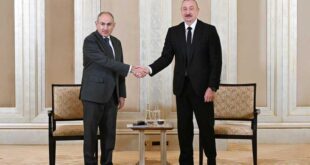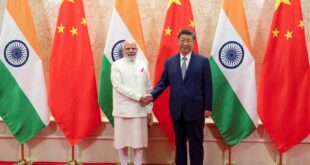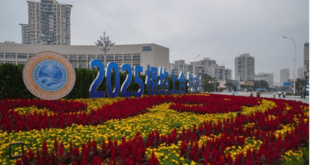Maria Dubovikova
The recent series of firings and appointments in the American administration have come quicker than expected. After the sudden dismissal of Secretary of State Rex Tillerson, US President Donald Trump appointed conservative politician and hardliner John Bolton as national security adviser, triggering mixed reactions. Bolton’s appointment as successor to H.R. McMaster has created an earth-shaking outcome worldwide, especially as the US government was already heading in a hawkish direction with the a
From the beginning of the Trump era, Bolton was named as a candidate for foreign affairs or national security. Although he was previously ruled out by Trump, the president had many times voiced his appreciation of Bolton’s approach to Iran and North Korea. While Trump’s foreign policy remains motivated by his “America First” motto, Bolton’s appointment came after Pompeo had already bolstered the hawkish
Are these appointments indicating a strike against North Korea? Are they a signal for ripping up the nuclear deal with Iran? Both Bolton and Pompeo favor a hard line approach to Pyongyang, possibly even a pre-emptive strike, and are for cancelling rather than amending the Iran deal.
The selection of Bolton means that the US is probably seeking to impose more sanctions on Russia following President Vladimir Putin’s election victory. Pompeo, US ambassador to the UN Nikki Haley and Bolton are all similar in their attitude toward Iran. They call on ending the pact with Tehran and even toppling the regime as they see no prospect of reforming the nuclear deal, which is deemed a strategic disaster for the US.
Thus, the three recent changes in the American administration — including the appointment of Gina Haspel as Pompeo’s successor as director of the CIA — means three hawkish officials will be dealing with North Korea and Iran in a harsh manner. All of this means the serious rise in tensions between Moscow and Washington in the Middle East and globally will continue. The three partisans all support US military involvement in conflicts, adopting regime change in rival countries, and the use of hawkish rhetoric.
It is important to remember that Bolton served as under secretary of state under George W. Bush, was the US ambassador to the United Nations between 2005 and 2006, and was one of the signatories to a letter sent to Bush shortly after 9/11, which publicly called for the US to launch a unilateral war to remove Saddam Hussein from power. Despite the disastrous outcome of that intervention, Bolton continues to boast that the Iraq War a right step.
With neocon hawks such as Bolton and Pompeo in place, the White House will be far less careful in its foreign policy decisions, potentially endangering the world by escalating conflicts and further destabilizing war zones.
Maria Dubovikova
Both Pompeo and Bolton reject the nuclear deal with Iran. Last August, Bolton presented a plan to rip up the agreement and to blacklist the Islamic Revolutionary Guard Corps for its terrorist activities. Thus, the three new appointments will support Iranian opposition forces in bringing about regime change, and will back imposing comprehensive sanctions that cripple the Iranian economy.
The views from Iran about these appointments are that the US seeks to humiliate an arch-enemy. However, this may have negative repercussions if Iran seeks Russian and Chinese support, leading to limited regional clashes that could lead to international involvement in the region on a larger scale.
The American appointments are considered an enhancement of its security approach, with Washington set to become more extreme and less rational. With the new White House team, there is a growing belief that the administration will not endorse the Iran agreement and will renew all US sanctions on Tehran, meaning Iran will
Britain, France and Germany had proposed new EU sanctions on Iran over its ballistic missile program and its role in the Syrian war in order to ensure the US will not revoke the nuclear deal or impose any further sanctions. This means further concessions from Iran, which Tehran will not accept.
The scene is generally viewed as being set for further tension. The US announced last December that it was working to build an international coalition to counter Iran’s behavior, calling on all countries to join it in facing down the Iranian threat and indicating that the international community should act before Iran becomes like North Korea.
Surprisingly, Russian reaction to the appointment of these hawkish figures in the White House has been quite reserved, with Moscow asserting that it is ready for constructive dialogue. Furthermore, during a question and answer session on an official visit in Hanoi, Russian Foreign Minister Sergey Lavrov shared his personal views regarding the personality of Bolton. Lavrov characterized him as “a professional” and “a tough diplomat and politician.” Lavrov added
Russia continues to hope that the US might start constructive dialogue with Moscow on the burning issues of the international agenda, but current trends show that the process is moving in the opposite direction. With neocon hawks such as Bolton and Pompeo in place, the White House will be far less careful in its foreign policy decisions, endangering the world by escalating conflicts and further destabilizing war zones. The chances of a Russia-US confrontation will increase significantly as the issues surrounding Syria, Iran and North Korea are less likely to be settled though dialogue as the US administration closes the door on talks.
- Maria Dubovikova is a prominent political commentator, researcher and expert on Middle East affairs. She is president of the Moscow-based International Middle Eastern Studies Club (IMESClub). Twitter: @politblogme
First published at ArabNews
 Geostrategic Media Political Commentary, Analysis, Security, Defense
Geostrategic Media Political Commentary, Analysis, Security, Defense





